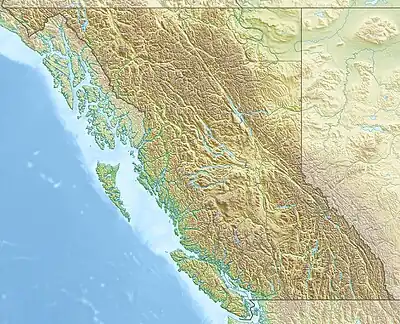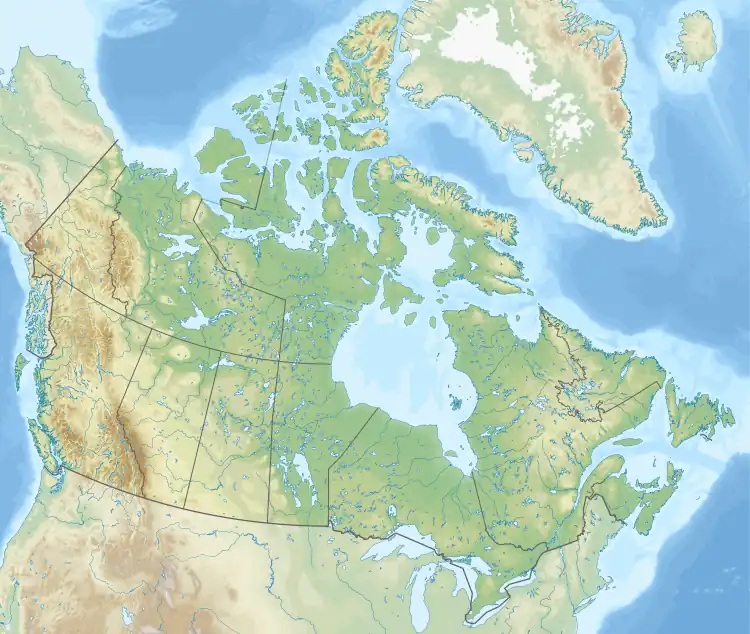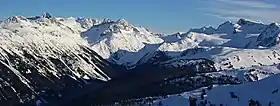| Mount Macbeth | |
|---|---|
 Mount Macbeth seen from Whistler Mountain | |
| Highest point | |
| Elevation | 2,639 m (8,658 ft)[1] |
| Prominence | 109 m (358 ft)[1] |
| Listing | Mountains of British Columbia |
| Coordinates | 50°02′16″N 122°47′49″W / 50.03778°N 122.79694°W[2] |
| Geography | |
 Mount Macbeth Location in British Columbia  Mount Macbeth Mount Macbeth (Canada) | |
| Country | Canada |
| Province | British Columbia |
| District | New Westminster Land District |
| Protected area | Garibaldi Provincial Park |
| Parent range | Spearhead Range Garibaldi Ranges Coast Ranges |
| Topo map | NTS 92J2 Whistler[2] |
| Climbing | |
| First ascent | 1969 by P. Starr, E. Bass, B. Ellis, P. Macec[1] |
Mount Macbeth is a 2,639-metre (8,658-foot) glacier-clad peak located in the Garibaldi Ranges of the Coast Mountains, in Garibaldi Provincial Park of southwestern British Columbia, Canada. It is part of the Spearhead Range, which is a subset of the Garibaldi Ranges.[3] It is situated 14 km (9 mi) southeast of Whistler, and 2 km (1 mi) south of Tremor Mountain, which is the highest point in the Spearhead Range.[3] The Naden Glacier spreads out below the eastern aspect of the summit, the Macbeth Glacier lies below the south aspect, and the Curtain Glacier descends the northern slope. Precipitation runoff from the peak and meltwater from its glaciers drains into Fitzsimmons Creek which is a tributary of the Cheakamus River. Macbeth is most often climbed as part of the Spearhead Traverse. The first ascent of the mountain was made in 1969 by P. Starr, E. Bass, B. Ellis, and P. Macec via the northeast ridge.[1] The peak was named in 1964 by an Alpine Club of Canada climbing party, to commemorate the 400th anniversary of William Shakespeare's birth.[4] The mountain's name was officially adopted on August 27, 1965, by the Geographical Names Board of Canada.[2]
Climate

Based on the Köppen climate classification, Mount Macbeth is located in the marine west coast climate zone of western North America.[5] Most weather fronts originate in the Pacific Ocean, and travel east toward the Coast Mountains where they are forced upward by the range (Orographic lift), causing them to drop their moisture in the form of rain or snowfall. As a result, the Coast Mountains experience high precipitation, especially during the winter months in the form of snowfall. Winter temperatures can drop below −20 °C with wind chill factors below −30 °C. The months July through September offer the most favorable weather for climbing Mount Macbeth.
Climbing Routes
Established climbing routes on Mount Macbeth:[1]
- Northeast Ridge - class 4 First Ascent 1969
- East Side - standard route on snow
- Southwest Face
- South Face
See also
References

- 1 2 3 4 5 "Mount Macbeth". Bivouac.com. Retrieved 2019-11-15.
- 1 2 3 "Mount Macbeth". Geographical Names Data Base. Natural Resources Canada. Retrieved 2019-11-15.
- 1 2 "Mount Macbeth, British Columbia". Peakbagger.com. Retrieved 2019-11-15.
- ↑ "Mount Macbeth". BC Geographical Names. Retrieved 2019-11-16.
- ↑ Peel, M. C.; Finlayson, B. L.; McMahon, T. A. (2007). "Updated world map of the Köppen−Geiger climate classification". Hydrol. Earth Syst. Sci. 11. ISSN 1027-5606.
External links
- Weather: Mountain Forecast
- Mt. Macbeth photo: Flickr